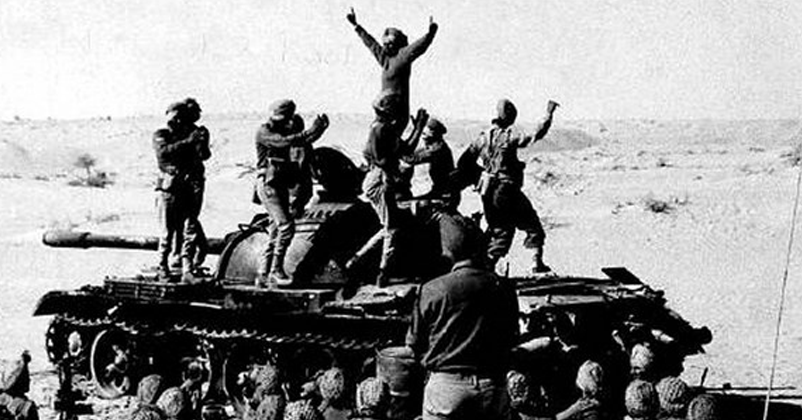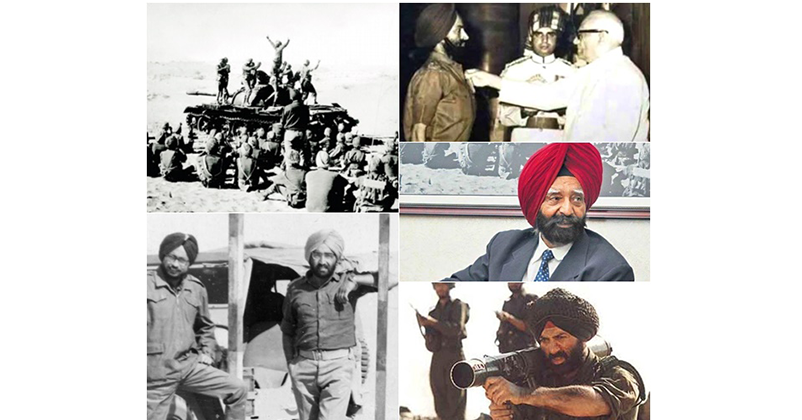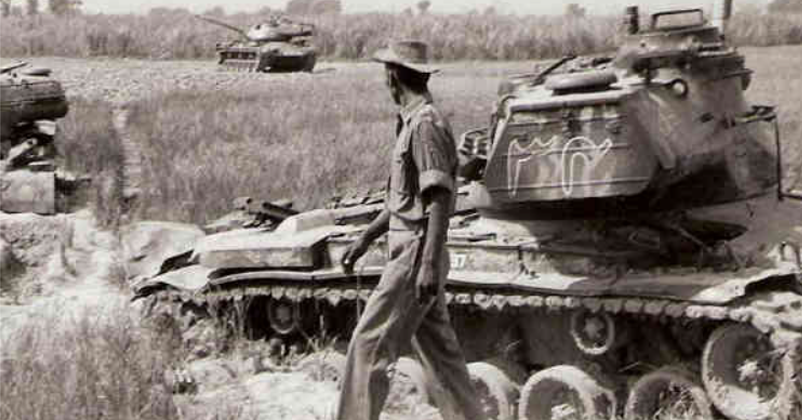Battle of Longewala: Pakistan lost 200 soldiers, 100 vehicles, including two dozen tanks. Against All Odds, the story of unalloyed courage
05 Dec 2021 13:40:09

By Sant Kumar Sharma
Jammu, December 5:
Major Kuldeep Singh Chandpuri of 23 Punjab had a difficult choice to make on December 4, 1971, when he was posted at Longewala in Rajasthan near border. He had 120 men of the unit with him, and some BSF personnel but intelligence suggested that a huge column of Pakistani tanks was headed towards the post. He radioed his Commanding Officer (CO) in the rear that he needed reinforcements pronto. Since no help was possible, he was given the choice to make a tactical retreat by abandoning the post.
To take to heels, to put it mildly in the face of daunting enemy. Or to dig in heels and defend, as they say, to the last bullet and last men. He tried getting help from the Indian Air Force (IAF) in the sector, but was disappointed as the fighter aircraft deployed nearby were Hawker Hunters, incapable of night combat. To his chagrin, he knew it clearly that night was advancing as inexorably as the enemy was. He made the difficult choice of defending, laying mines around the post which was at an elevated level commanding a clear view of the direction from which tank column was to advance.
Fortune favours the brave proved true to the last word that night when Major Chandpuri became a legend in the Indian Army overnight for that one night stand. That night when in the moonlit desert, he could see every forward movement of the enemy clearly but asked his men to hold fire till the last moment. He wanted to conserve the ammunition available at the post and wanted to give it all to enemy when it was within effective firing range. Some shoulder fired anti tank weapons, a couple of RCL mounted jeeps were the heaviest weapons that all he had against the menacing tank column.

As luck would have it, the advance tanks saw the barbed wire and mistook it for an anti-tank minefield, which it was not. Though some mines had indeed been placed ahead of the Longewala post. Pakistani column hesitated, requisitioned services of engineers to clear the imaginary mining field and some hours passed with no firing from either side. The frontal assault on the post that Pakistanis had planned got stalled for a few hours. Invaluable for Major Chandpuri who utilised the time to go to each trench and bolster his men’s morale and acquaint himself with all that he had.
A couple of hours later, the Pakistani engineers gave the go ahead to the advancing tanks and a ferocious all-out attack began on the post. The defenders also retaliated. The Pakistani tanks were carrying external fuel tanks for keeping extra fuel with them and some of the bullets fired from the post caused blasts in them. A couple of rounds fired by RCL guns also broke the tracks of some tanks. The lose sand under the tanks also did not help as they could not advance as they had perhaps planned.
The heavy volume of well directed fire from the dugouts gave an impression that far more than 120 men were defending the post. After a couple of hours of intense fighting, it was dawn, and with the first light IAF fighters got airborne and started shooting at the enemy tanks. It is one of the most one-sided tank battles recorded in the annals of war. The numerical superiority of the Pakistani soldiers, numbering about 2,000 having tank support, came to naught and in utter confusion, Pakistanis tried to flee. But soft sand made retreat virtually impossible as some tank engines got overheated and stalled. These were then abandoned and the occupants took to heels on foot, to be shot down.

In IAF, the hunting of tanks on December 5 morning was called ``turkey shooting’’, so easy was picking up targets and shooting at them, according to pilots who took part in the action. The loss o the Indian side was two killed, while on the Pakistani side, the casualties stood at over 200. This is perhaps one of the most disproportionate record of casualties suffered by one side and demoralised the Pakistani planners.
It is ironical but true that the real extent of heroics shown by 120 Indian soldiers became known nationwide after J P Dutta wrote, produced and directed the movie Border in 1997. In the movie, Sunny Deol plays the role of Major Chandpuri who led these troops of 23 Punjab. The movie is based on Battle of Longewala which is being re-enacted by the Army near the post in Rajasthan right now. Late Chandpuri’s son Hardeep Puri, and other members of the family, have been invited by the Army to attend the ceremony.
With the help of some Indian Air Force (IAF) aircraft, in which Hunters played a lead role, over 100 vehicles of Pakistan, including two dozen tanks were damaged or destroyed around the Longewala post. This is perhaps one of the most disproportionate record of casualties suffered by one side and demoralised the Pakistani planners.
Pakistani divisional commander was dismissed from service over this fiasco once the war was over. Major Chandpuri, on the other hand, got Maha Vir Chakra, for making that choice to stand up and be counted!
Against All Odds is an official autobiography of Chandpuri who rose to become a Brigadier later. The book has been written by a police officer, SP Gurjot Singh Kaler. Brigadier Chandpuri had authorised Kaler to write this book and wanted it released on the occasion of 50th year of the historic battle. Unfortunately, Brigadier Chandpuri is not among us now but he told Kaler once that whatever he could achieve was because of the steadfast resolve of the men he commanded. All 120 of them who were with him in that battle.